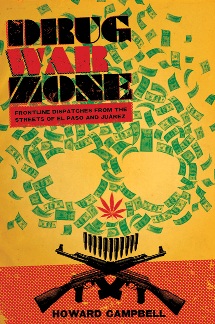Every now and then authorities discover an electrified, air-conditioned tunnel underneath our border with Mexico or Canada, presumably built for drug smuggling. How many such tunnels go undiscovered? And does it take more than one successful smuggling operation to pay for a tunnel's construction?
For the first time in nearly a century, the California legislature took up marijuana legalization on this week. A Wednesday hearing on a legalization bill previewed the battle lines and arguments that lie ahead.
If you're interested in the border or Mexico's drug war or drug culture or drug economy, or in drug law enforcement, we've got a book you need to read. University of Texas-El Paso sociologist and anthropologist Howard Campbell provides a vivid, rich, and nuanced portrayal of drugs and the drug war in El Paso-Juarez that couldn't be more timely.
"America's Giving Challenge" is offering prizes ranging from $500 to $50,000 to nonprofits who get the largest number of gifts from supporters between now and November 7. Any gift of $10 or higher -- made through the "Causes" program, which is linked in to Facebook -- counts equally toward the prize, and gifts can be made up to once a day. StoptheDrugWar.org is a contestant, and we're asking for your help by participating and by spreading the word.
Mexico's wave of prohibition-related violence grinds on, and Ciudad Juárez remains the epicenter.
More crooked jail guards, and a trooper who must have had a whopper of a habit.
Rep. Sam Farr (D-CA) has reintroduced the Truth in Trials Act, which would allow medical marijuana providers prosecuted under federal law to introduce medical evidence during their trials.
New Hampshire will not become the 14th medical marijuana state -- at least, not yet. An effort to override Gov. Mark Lynch's veto fell two votes short in the state Senate Wednesday. Supporters vow to keep working.
The DEA suffered its first spilled blood in Afghanistan Monday when three of its agents were killed in a helicopter crash that also took the lives of seven US soldiers. The chopper was returning from a drug raid when it went down.
Medical marijuana caregivers must actually know the patients for whom they are growing pot, the Colorado Court of Appeals has ruled. The opinion, if upheld on appeal, could put a crimp in the state's fast-growing medical marijuana industry.
In an address to an international health conference in Vietnam, the UN's top health rights official slammed forced "rehab camps" and called for decriminalizing drug use. As many as half million people could be locked up in punitive, old-school mass detoxification camps.
If you are trying to figure out which Latin American country will be the first to legalize marijuana, you can probably eliminate Chile. Support for legalization there is in the teens -- and declining.
Events and quotes of note from this week's drug policy events of years past.
Every two years drug policy reformers from across the United States and around the world come to the International Drug Policy Reform Conference to listen, learn, network and strategize together for change. This year the conference is in Albuquerque, in November, and StoptheDrugWar.org is a partner.
Do you read Drug War Chronicle? If so, we need your feedback to evaluate our work and make the case for Drug War Chronicle to funders. We need donations too.
Apply for an internship at DRCNet and you could spend a semester fighting the good fight!
"Marijuana Debate! Former Judge vs. Several Complete Idiots," "Efforts to Stop Drugs at the Border Have Become a Joke," "It's Not Just Marijuana -- DEA is at War With Other Medicines Too," "A Marijuana Blog That's the Opposite of All the Others," "Obama Isn't Plotting to Legalize Marijuana, But Everyone Else Is," "Former Drug Czar Lies About His History of Attacking Medical Marijuana," "It's Official: The Media is in Love With Marijuana Legalization," "An Historic Hearing on Marijuana Legalization in Sacramento," "Our Side: San Diego ASA Protests State Narcs Lobby Awards," "Heroin Maintenance Comes to Denmark" and "Nice Article on Wisconsin's Medical Marijuana Bill and the Movement Supporting It."
David Borden, Executive Director

David Borden
Last year I attended a small lunch-time forum on the subject of immigration and the US-Mexico border. Seated at the table was a man in a military uniform, not one of the speakers, but clearly eager to say his piece. After the presentation was over, he put up his hand, told us he was an officer with Southcom -- the branch of the Armed Forces dealing with areas to the south of the United States -- and that his military education and experience told him that walls don't stop people. Walls just slow people down, he said -- you can go over a wall, you can through it, you can go around it, or you can go under it. And militarily he understood that a wall spanning our border would not slow people down enough to stop the kind of traffic that we have crossing the border -- not unless we simply shoot people to kill on sight, which he was unwilling to do.
Whatever one thinks about immigration, or attempts to block it at the border, the reasoning has clear implications for the so-far ineffective attempts at drug interdiction. If it is either impossible or at least difficult to stop people at the border -- and since we haven't managed to do it so far, it must at least be difficult -- how difficult must it be to stop the flow of drugs? After all, people have a certain height and width and depth, and they need oxygen and occasionally food and water and space to move. Drugs can be packaged in any shape or size, they don't require maintenance over the period of time involved in trafficking them, and a fairly small volume of certain drugs can be worth a small mint. It's fairly safe to say that drugs are not going to be kept out of this country, no matter how hard we try. It is simply not going to happen.
Since that time the issue has taken on a new degree of poignancy and urgency. Since Mexican President Calderon took office in 2006 and began his attempted crackdown against the cartels, more than 12,000 Mexicans have died in the surge of violence that followed. The 2009 death toll alone has passed 6,000. Because drugs are illegal, all the money people spend on them in the US goes into a criminal underground where violence is often the rule. The unabated flow of drugs across the US-Mexico border is powerful evidence of prohibition's failure.
The past week offered up a more visual form of evidence to make the point. Across the border from San Diego in Tijuana a partially-completed smuggling tunnel was found. They got almost as far as the border fence. It was found by the authorities before being finished, but not very long before. Military officials took a group of reporters to see it on Tuesday. The tunnel had been equipped with electricity and an air supply, according to the Associated Press.
The tunnel is neither a new nor unique development. Last year one was found in the Mexican state of Baja California. That one had an elevator and rail transport system. At least 75 have been found since the 1990s, according to the Immigration and Customs Enforcement bureau (ICE). They're not limited to our southern border, either.
My two questions are: How many successful drug smuggling operations are needed in order to pay for constructing and maintaining such a tunnel -- might it only need to be used once? -- and how many more tunnels are there that have never been found? I have a feeling that there are many undiscovered smuggling tunnels, and that the cost of building one with air-conditioning and electric transportation is low compared with the likely rewards. Mexico offers a virtually unlimited labor pool. The proof that the cost is low is simply the fact that they keep building them over and over. They wouldn't keep building the tunnels if it weren't a cost-effective strategy.
Don't expect the drug trade to slow anytime soon, at least not because of law enforcement, and don't let the pictures of the latest tunnel or drug seizure fool you into thinking it might. Hope that something happens to stop the wave of violence terrorizing our southern neighbors and threatening our borders possibly too. But don't expect that finding another tunnel is what will do that.
back to top
In an historic hearing Wednesday, the California legislature examined the pros and cons of marijuana legalization. The hearing marked the first time legalization has been discussed in the legislature since California banned marijuana in 1913.

Ammiano press conference for hearing
Onlookers and media packed the hearing room for the three-hour session. Capitol employees had to hook up remote monitors in the hallway for the overflowing crowd of supporters and opponents of marijuana legalization.
The hearing before the legislature's Public Safety Committee was called for and chaired by Assemblyman Tom Ammiano (D-SF), who earlier this year introduced AB 390, a bill that would legalize, regulate, and tax marijuana in the state. While Ammiano has made clear that he supports legalization, the witness list for the hearing was well-balanced, with legislative analysts and representatives of law enforcement as well as reform advocates in the mix.
The hearing began with testimony from legislative analysts, who estimated that the state could realize tax revenues ranging from hundreds of millions to nearly $1.4 billion a year from legalization. The latter figure was from the state Board of Equalization, while the lower estimates came from the Legislative Analyst's Office.
But tax revenues wouldn't be the only fiscal impact of legalization. "If California were to legalize, we would no longer have offenders in state prison or on parole for marijuana offenses," noted Golaszewski. "We estimate the savings there at several tens of millions of dollars a year. There would also be a substantial reduction in the number of arrests and criminal cases law enforcement makes. To the extent they no longer have to arrest people for marijuana, they could shift resources elsewhere."
Golaszewski said there are roughly 1,500 people imprisoned on marijuana charges in California, 850 of them for possession offenses.
The analysts were followed by a panel of attorneys who debated the legality of state legalization. "If California decides to legalize, nothing in the Constitution stands in its way," said Tamar Todd, a staff attorney for the Drug Policy Alliance Network.
But while Marty Mayer, attorney for the California Peace Officers Association (CPOA), generally agreed with that assessment, he also argued that the state could not unilaterally legalize. "The state of California cannot unequivocally legalize marijuana," he said, noting that marijuana is prohibited under federal law.
Next up were the cops, and there were no surprises there. "Marijuana radically diminishes our society," said CPOA president John Standish. "Marijuana is a mind-altering addictive drug that robs you of memory, motivation, and concentration," he said before Ammiano cut him short, noting that the purpose of the hearing was to discuss public safety and economic impacts of legalization, not to debate marijuana's effects on health.
"Alcohol and cigarettes are taxed to the hilt, but the taxes don't cover the cost of medical treatment, let alone DUIs," Standish continued. "This would lead to an increase in crime rates, social costs, medical costs, and environmental concerns. There is also a very real concern that Mexican drug cartels are behind most of the imported marijuana coming into the US," he added, without explaining what that had to do with legalizing marijuana production in California.
And, pulling out yet another woolly chestnut, Standish resorted to the old and discredited "gateway theory" that marijuana use is a stepping stone to hard drug use. "Marijuana is a gateway drug," he said. "Every incident in 30 years of law enforcement I have been in where marijuana has been involved has not been good. Both marijuana and methamphetamine are equally critical problems," he said.
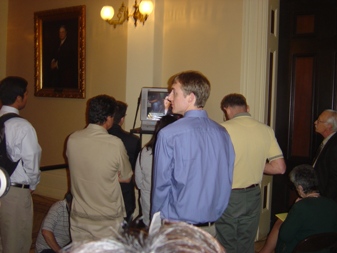
overflow room
After reciting a short list of violent incidents around large-scale illegal grows allegedly operated by Mexican drug cartels, Sara Simpson, acting assisting chief of the Attorney General's Bureau of Narcotics Enforcement, warned that the cartels were likely to try to maintain their market share. "That could lead to more violence," she warned.
"Legalizing marijuana is bad public policy," said Simpson. "A significant number of marijuana users are incapacitated," she claimed. "When a recreational drug user backs over your four-year-old, you consider yourself a victim of violent crime. Legalization would increase death and injury totals."
"Why would we want to legalize a substance known to cause cancer?" asked Scott Kirkland, chief of police in El Cerrito and chairman of the California Police Chiefs' Medical Marijuana Task Force. "Legalization will only result in increased use of marijuana with a corresponding increase in drugged driving," he warned.
But later witnesses said that California was simply wasting resources by arresting marijuana offenders. Dan Macallair, executive director of the Center on Juvenile and Criminal Justice, said that arrest statistics from the past 20 years show that California law enforcement is more focused on prosecuting simple possession cases than cultivation and sales.
"California's drug war, particularly on marijuana, is focused on drug users," he said. "Virtually every category of crime has declined since 1990, except for a dramatic increase in arrests for marijuana possession. In 1990, there were 20,834 arrests for possession. Last year, there were 61,388 arrests. "
This was going on while arrests for all other drug offenses declined, Macallair said. For all other drugs, arrests were down 29%. Even marijuana manufacture and sales arrests had declined by 21%. More people went to prison in California in 2008 for marijuana possession than for manufacture or sales, he added.
"Our courtrooms are full every day with marijuana cases," said Terence Hallinan, the former San Francisco City and County District Attorney. "It's still against the law to sell even a gram. There are a lot of people in court and jail for marijuana offenses."
The Rev. Canon Mary Moreno Richardson of St. Paul's Episcopal Cathedral in San Diego told the committee marijuana law enforcement has especially pernicious effects on the young. "When they find a group of kids with a joint, they take them all in to juvie. When they're incarcerated, they join gangs for safety. Jails have become the boot camps for the gangs," she said. "We need to think about and protect our youth."
"I speak on behalf of California's millions of marijuana users who are tired of being criminals and would like to be taxpaying, law-abiding citizens," said Dale Gieringer, executive director of California NORML. "We think it makes no sense for taxpayers to pay for criminalizing marijuana users and their suppliers when we could be raising revenues in a legal market."
"Today, our marijuana laws are putting our children in harm's way," said retired Orange County Superior Court Judge James P. Gray. "We want to reduce the exposure of a lifestyle of marijuana use and selling to our children, but prohibition's illegal dealers don't ask for ID," he said.
At the end of the hearing, Ammiano opened the floor to public comment. While most speakers supported legalization, a contingent of conservative African-American religious leaders vigorously denounced it. "I know from personal experience the devastation that occurs in one's life and community as a result of drug abuse that began with marijuana," said Bishop Ron Allen, founder and president of the International Faith Based Coalition.
Also in opposition was Californians for Drug Free Youth. John Redman, the group's director, said legalizing marijuana to raise revenues was reprehensible. "This is blood money, pure and simple," Redman said.
The battle lines are shaping up. On one side are law enforcement, conservative clerics, and anti-drug zealots. On the other are researchers, activists, and, evidently, the majority of Californians. Ammiano gave as a handout at the hearing a sheet listing at least six recent polls showing majority support for marijuana legalization in the state.
The bill isn't going anywhere for awhile. Ammiano said he will hold more hearings later and may revise it based on the hearings. But marijuana legalization is now before the legislature in California.
back to top
Phillip S. Smith, Writer Editor
Howard Campbell's "Drug War Zone" couldn't be more timely. Ciudad Juárez, just across the Rio Grande from El Paso, is awash in blood as the competing Juárez and Sinaloa cartels wage a deadly war over who will control the city's lucrative drug trafficking franchise. More than 2,000 people have been killed in Juárez this year in the drug wars, making the early days of Juárez Cartel dominance, when the annual narco-death toll was around 200 a year, seem downright bucolic by comparison.
The violence in Mexico, of which Juárez is the current epicenter, has been setting off alarm bells in Washington, and the US has responded with thousands more law enforcement agents on the border and more than a billion dollars in aid to the Mexican government. In other words, what we've been doing hasn't worked, so let's do even more of it, even more intensely.
We've all seen the horrific headlines; we've all seen the grim and garish displays of exemplary violence; we've read the statistics about the immense size of the illegal drug business in Mexico and the insatiable appetites of drug consumers in El Norte ("the north," e.g. the US). What we haven't had -- up until now -- is a portrayal of the El Paso-Juárez drug trade and drug culture that gets beneath the headlines, the politicians' platitudes, and law enforcement's self-justifying pronouncements. With "Drug War Zone," Campbell provides just that.
He's the right guy in the right place at the right time. A professor of sociology and anthropology at the University of Texas-El Paso who has two decades in the area, Campbell is able to do his fieldwork when he walks out his front door and has been able to develop relationships with all sorts of people involved in the drug trade and its repression, from low-level street dealers in Juárez to middle class dabblers in dealing in El Paso, from El Paso barrio boys to Mexican smugglers, from journalists to Juárez cops, from relatives of cartel victims to highly-placed US drug fight bureaucrats.
Using an extended interview format, Campbell lets his informants paint a detailed picture of the social realities of the El Paso-Juárez "drug war zone." The overall portrait that emerges is of a desert metropolis (about a half million people on the US side, a million and a half across the river), distant both geographically and culturally from either Washington or Mexico City, with a long tradition of smuggling and a dense binational social network where families and relationships span two nations. This intricately imbricated web of social relations and historical factors -- the rise of a US drug culture, NAFTA and globalization -- have given rise to a border narco-culture deeply embedded in the social fabric of both cities.
(One thing that strikes me as I ponder Campbell's work, with its description of binational barrio gangs working for the Juárez Cartel, and narcos working both sides of the border, is how surprising it is that the violence plaguing Mexico has not crossed the border in any measurable degree. It's almost as if the warring factions have an unwritten agreement that the killings stay south of the Rio Grande. I'd wager they don't want to incite even more attention from the gringos.)
Campbell compares the so-called cartels to terrorists like Al Qaeda. With their terroristic violence, their use of both high tech (YouTube postings) and low tech (bodies hanging from bridges, warning banners adorning buildings) communications strategies, their existence as non-state actors acting both in conflict and complicity with various state elements, the comparison holds some water. Ultimately, going to battle against the tens of thousands of people employed by the cartels in the name of an abstraction called "the war on drugs" is likely to be as fruitless and self-defeating as going to battle against Pashtun tribesmen in the name of an abstraction called "the war on terror."
But that doesn't mean US drug war efforts are going to stop, or that the true believers in law enforcement are going to stop believing -- at least most of them. One of the virtues of "Drug War Zone" is that it studies not only the border narco-culture, but also the border policing culture. Again, Campbell lets his informants speak for him, and those interviews are fascinating and informative.
Having seen its result close-up and firsthand, Campbell has been a critic of drug prohibition. He still is, although he doesn't devote a lot of space to it in the book. Perhaps, like (and through) his informants, he lets prohibition speak for itself. The last interview in the book may echo Campbell's sentiments. It's with former Customs and Border Patrol agent Terry Nelson. In the view of his former colleagues, Nelson has gone over to the dark side. He's a member of Law Enforcement Against Prohibition.
If you're interested in the border or drug culture or the drug economy or drug prohibition, you need to read "Drug War Zone." This is a major contribution to the literature.
back to top
Dear Reformer:
Our organization, StoptheDrugWar.org (DRCNet), is a participant in "America's Giving Challenge," a contest to help nonprofits by offering prizes ranging from $500 to $50,000 to those who receive the largest number of donations through the "Causes" program by November 7. The key is not the size of the donation -- Causes will accept any gift of $10 or more, and any gift no matter how large or small counts equally in the contest. Supporters can make donations that count in the contest up to once a day.
Please donate today to help StoptheDrugWar.org win this much-needed funding -- http://www.causes.com/donations/select_donation_method?cause_id=205062 -- Causes is linked in to Facebook too, and that means you can help by asking your friends on Facebook to donate to StoptheDrugWar.org in the Challenge too.
But don't just ask your friends to donate, as important as that is. Write your friends to tell them how important it is to reform drug policy and eventually end prohibition itself. Send them this week's issue of our Drug War Chronicle newsletter. Ask them to watch our video about abusive SWAT Raids. Tell them why you feel the drug war is wasteful and unjust and bad for our country. If you've donated -- through the Challenge today or in the past -- tell them that, it will make a difference.
Again, the amount of your donation is less important for this contest than the fact that you are giving through the contest. (Of course the larger the gift, the more it will help us directly, but the small gifts add up too.) And even if we don't end up winning, but come close, thousands of people giving money to their favorite nonprofits may see us in the runner-up list and come to check us out and join our cause too. So please visit http://www.causes.com/donations/select_donation_method?cause_id=205062 today, or by November 7 the latest, to support StoptheDrugWar.org in America's Giving Challenge.
Remember that we do what we can from Washington, but in the end it's YOU who represents the cause of stopping the drug war -- to your friends, on Facebook, in your community. If all of us come together, we can win -- not just in the Giving Challenge, but in the court of public opinion and then in Congress.
http://www.causes.com/donations/select_donation_method?cause_id=205062
Thank you!
Sincerely,

David Borden, Executive Director
P.S. If you'd rather not participate in the Challenge, but would still like to donate to us, you can do so here.
back to top
by Bernd Debussman Jr.

How many shipments are needed to pay for one drug smuggling tunnel?
Mexican drug trafficking organizations make billions each year trafficking illegal drugs into the United States, profiting enormously from the prohibitionist drug policies of the US government. Since Mexican president Felipe Calderon took office in December 2006 and called the armed forces into the fight against the so-called cartels, prohibition-related violence has killed over 12,000 people -- the body count passing 6,000 for 2009 so far this month. The increasing militarization of the drug war and the arrest of several high-profile drug traffickers have failed to stem the flow of drugs -- or the violence -- whatsoever. The Merida initiative, which provides $1.4 billion over three years for the US to assist the Mexican government with training, equipment and intelligence, has so far failed to make a difference. Here are a few of the latest developments in Mexico's drug war:
Saturday, October 24
A high ranking federal police official was assassinated in Chihuahua. Jose Alfredo Silly Pena was a naval captain who served as a federal police intelligence official. He, along with three other men, had been kidnapped by heavily armed men some hours earlier. Additionally, 23 people were killed in violence in Chihuahua during a 48-hour period. 18 of these murders occurred in Ciudad Juárez. In Guerrero, four bodies were found in a hidden pit just meters from where seven bodies had been found last Tuesday. In other parts of Mexico, an unidentified gunman was killed by the army near Tlapehuala, and two more were killed and six captured after battling soldiers near Tamaulipas. The day before, four people, including two police officers, were killed after a firefight in Hidalgo; two people were killed in Michoacán, and three each in Durango, Coahuila, and Oaxaca.
Sunday, October 25
In Torreon, Coahuila, gunmen ambushed the convoy of the municipal public safety director. The official survived, but a nearby civilian was killed in the ensuing firefight. In another part of Torreon, a gun battle left two other people dead, one of whom was apparently homeless. Fifteen people were killed in Chihuahua, 14 of whom were killed in Ciudad Juárez. One of the dead was head of the police anti-theft unit, who was gunned down in a restaurant as he ate. At least three killings occurred in Sinaloa, and two women were kidnapped after being snatched from their car on the highway. At least three people were killed in Sonora, including a lawyer and a reputed gang leader.
The AP reported that dozens of ICE officials have been investigated for their handling of informants. Allegations include that ICE steered investigators away from a man who has since been charged with the El Paso murder of Jose Daniel Gonzalez Galeana. Galeana was a Juárez cartel manager and ICE informant. Additionally, ICE officials are being accused of allowing a man -- described as a "homicidal maniac" by the DEA -- to continue to be an informant even after having supervised the killing of a Juárez cartel associate.
Tuesday , October 27
In Puebla, four police officers were killed and a fifth wounded after being shot by gunmen. The officers were performing a traffic stop of a suspicious vehicle when another truck pulled up from which several heavily armed gunmen emerged and opened fire in an apparent attempt to "rescue" the passengers of the first vehicle.
In Nayarit, four men have been arrested in the videotaped and widely publicized torture of five teenagers. It appears the five boys had attempted to rob a house when they were captured by heavily armed vigilantes. In addition to being beaten and threatened with weapons, the boys were forced to kiss each other. The boys were later dumped naked on a street. There has been increased activity in recent months by vigilante groups thought to be linked to drug traffickers or members of the police.
Wednesday , October 28
Mexican soldiers have discovered an enormous, partially completed tunnel which ends just across the border from Otay Mesa, California. The tunnel, which was incomplete, came complete with electricity and an air supply system. Journalists in Tijuana were invited to tour the site, which is the latest of many similar discoveries in recent years.
Mexican police have arrested a man suspected of being La Familia's operations chief for the state of Michoacán. The man, Abel Valadez Oribe, 32, was on his way to a cockfight when he was detained by police after being tipped off by informants. Oribe, also known as "El Clinton," is also suspected of ordering multiple murders, including that of the mayor of Ixtapan de la Sal. His arrest comes a week after 303 suspected members of La Familia were arrested across the United States. In another part of Michoacán, the dismembered remains of an unidentified man were found by the roadside near Uruapan. Uruapan was the site of one of the most publicized incidents of the Mexican drug war in 2006, when gunmen threw five severed heads onto a dance floor in a local nightclub.
Total body count for the week: 157
Total body count for the year: 6,175
back to top
More crooked jail guards, and a trooper who must have had a whopper of a habit. Let's get to it:
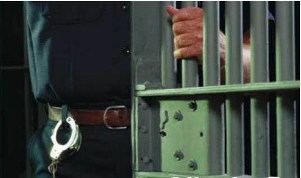
If we can't keep drugs out of the prisons, how can we keep them out of the country?
In Newark, New Jersey,
a New Jersey state trooper was indicted Tuesday on heroin possession charges. Trooper Jason Hanrahan had been arrested January 15 after he was observed buying heroin from a Newark man, who has also been indicted. Hanrahan was allegedly in possession of "less than a half ounce" of heroin when he was detained. Although Hanrahan was not charged with a drug trafficking or intent or conspiracy charge, a half ounce of heroin is much, much more than the typical personal dose. Since New Jersey law separates heroin possession offenses by weight, and less than half an ounce is the offense for which small-time possessors are charged, Hanrahan could have been popped with only a personal dose or two. Or he could have been popped with nearly a half ounce. If the former, Hanrahan doesn't belong in the corrupt cop crowd -- he's just another user who got caught. Either way he is looking at up to five years in prison and a $15,000 fine.
In Raleigh, North Carolina, a former Wake County Jail guard was arrested last weekend for selling drugs and providing a weapon to an inmate. Former guard Timothy Bullock, 26, faces six counts each of selling or delivering marijuana, conspiring to sell or deliver marijuana, and possession of marijuana with intent to sell or distribute. He will also face eight counts of providing drugs to an inmate. The offenses allegedly took place in April and May. Bullock quit his job in May. The inmate has also been arrested. Bullock was jailed on a $100,000 secured bond.
In Chattanooga, Tennessee, a Silverdale Detention Center guard was arrested Monday on charges of possessing drugs in a jail and inappropriate contact with inmates. Guard Sifrona Cotton, 31, was arrested by Hamilton County sheriff's deputies. Silverdale is a privately owned prison operated by Corrections Corporation of America.
back to top
US Rep. Sam Farr (D-CA) and more than 20 congressional cosponsors Tuesday introduced a bill that would allow defendants in federal medical marijuana prosecutions to use medical evidence in their defense -- a right they do not have under current federal law. The Truth in Trials Act, H.R. 3939, would create a level playing field for such defendants.
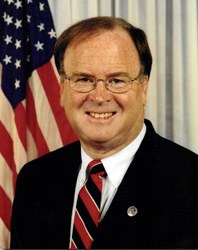
Sam Farr
"This is a common sense bill that will help stop the waste of law enforcement and judicial resources that have been spent prosecuting individuals who are following state law," Rep. Farr said on Tuesday. "We need strict drug laws, but we also need to apply a little common sense to how they're enforced. This legislation is about treating defendants in cases involving medical marijuana fairly, plain and simple."
More than a hundred medical marijuana providers have been prosecuted for violating federal marijuana laws, and more cases are coming down the pike. More than two dozen cases are currently pending. While the Justice Department last week issued guidelines to federal prosecutors discouraging them from prosecuting providers who comply with state medical marijuana laws, that guidance does not require that courts or prosecutors allow testimony about medical marijuana, nor does it suggest that prosecutors drop those cases.
"The Truth in Trials Act will restore the balance of justice and bring fundamental fairness to federal medical marijuana trials," said Caren Woodson, government affairs director with Americans for Safe Access (ASA), the nation's largest medical marijuana advocacy group. "This legislation complements the recent Justice Department guidelines for federal prosecutors and is now more necessary than ever."
While Farr has introduced the Truth in Trials bill in earlier sessions, supporters hope this time the bill will gain some traction. It has already been endorsed by more than three dozen advocacy, health, and legal groups, including ASA, the ACLU, the National Association of People With AIDS, the National Minority AIDS Council, and the AIDS Action Council.
back to top
Three months after New Hampshire Gov. John Lynch (D) vetoed a medical marijuana bill, bill supporters attempting to override the veto came up one vote short in the state Senate Wednesday. A two-thirds majority was required to override. The override effort had successfully passed the House earlier in the day.

almost but not quite at the New Hampshire Statehouse
The House voted to override the veto by a vote of 240-115, or 67.7% of the vote. But supporters failed to pick up a single vote in the Senate, and that made all the difference. The Senate vote both last summer and this week was 14-10 to override. It would have taken 16 votes to reach a two-thirds majority.
The bill, HB 648, would have established three nonprofit dispensaries to distribute up to two ounces of marijuana every 10 days to patients whose use had been approved by a doctor. Patients could be approved for chronic or terminal conditions that included cachexia, or wasting disorder; chronic pain; or nausea or muscle spasms. They would have had to register with the state to obtain an ID card.
In his veto message earlier this year, Gov. Lynch cited concerns about cultivation and distribution, as well as the opposition of law enforcement. Lawmakers had attempted to address those concerns in conference committee, crafting a tightly-drafted bill, but Lynch was unmoved.
"It's up to 16 of us in this chamber to look at those who are suffering to say, 'I understand and I will help','' said Sen. Peggy Gilmour (D-Hollis). But every senator who voted against the measure earlier this year voted against the override Wednesday.
Pushing for the bill was the New Hampshire Coalition for Common Sense, backed by the Marijuana Policy Project (MPP). "You never give up hope so I'm disappointed," coalition spokesman Matt Simon told the Nashua Telegraph. "Now I'm not looking forward to making those difficult calls to people depending on the legislature to relieve their unrelenting pain."
In fact, Simon and other medical marijuana supporters are looking to inflict a little pain on legislators who voted against them. In a message to supporters after the override failed, MPP pointedly noted that two senators who had voted against the override, Betsi DeVries and Ted Gatsas, are up for reelection in Manchester next week.
back to top
Three DEA agents and seven US soldiers were killed Monday when their helicopter crashed as they were returning from a firefight with suspected drug traffickers in western Afghanistan. They were among 14 US casualties suffered in helicopter crashes Monday. An additional eight US soldiers were killed Tuesday, making October the bloodiest month for the US in Afghanistan since it invaded and occupied the country eight years ago.

DEA memorial for agents Leamon, Michael and Weston
The
DEA identified the dead agents as Forrest Leamon, 37; Chad Michael, 30; and Michael Weston, 37. Leamon and Michael were members of the DEA's FAST (Foreign-deployed Advisory and Support Teams) and Weston was assigned to the DEA's Kabul country office. Their deaths were the first reported by the DEA since it initiated operations in Afghanistan in 2005 in a bid to thwart the country's multi-billion dollar opium trade.
Afghanistan supplies more than 90% of the world's illicit opium, the raw ingredient for heroin. The UN Office on Drugs and Crime reported last week that Taliban insurgents earn as much as $160 million a year from taxing poppy farmers, protecting drug shipments, and operating their own drug smuggling networks. Those funds help finance Taliban operations against US and NATO forces and their allies in the Afghan armed forces.
The helicopter crashed in the predawn hours Monday after returning from a raid in which US and Afghan soldiers attacked a suspected drug trafficking compound. The US military said a dozen insurgents were killed in the raid. The Taliban claimed credit for shooting down the chopper, but US officials denied that it had gone down because of enemy fire.
The incident came as Afghan officials fiercely criticized a US military hit list of about 50 suspected drug traffickers, saying targeting them to be killed or captured "on the battlefield" undermines the Afghan justice system and could trigger a backlash against foreign troops. It was unclear if the compound attacked Sunday night belonged to a trafficker on the hit list.
Anti-Western sentiment is already running high in Afghanistan. This weekend, police in Kabul clashed with anti-American rioters infuriated by rumors that American soldiers had burned a copy of the Koran. Several people were wounded when police opened fire on the angry crowd.
back to top
In an opinion released Thursday, the Colorado Court of Appeals has ruled that persons designated as "caregivers" under the state's medical marijuana law must do more than merely supply marijuana to patients. In so doing, the court upheld the conviction of a Longmont woman, Stacy Clendenin, who argued that marijuana she grew in her home was distributed to authorized patients in dispensaries.

Colorado state medical marijuana application
That wasn't good enough for the appeals court. Caregivers authorized to grow marijuana for patients must actually know the patients they are growing for, the court said.
"We conclude that to qualify as a 'primary care-giver' a person must do more than merely supply a patient who has a debilitating medical condition with marijuana," the court ruled.
The ruling, if upheld on appeal, threatens to put a crimp in Colorado's burgeoning medical marijuana industry. Dozens of dispensaries have sprung up in the state this year, and growers have been supplying some of them.
That has sparked calls for reining in the dispensaries, a call that was echoed in a concurring opinion to the ruling. In his concurrence, Judge Alan Loeb wrote that Colorado's constitutional amendment legalizing medical marijuana "cries out for legislative action."
Attorney General John Suthers told the Denver Post he applauded the decision. "I am pleased to see the Court of Appeals has provided legal support for our case that a caregiver, under Amendment 20, must do more than simply provide marijuana to a patient," Suthers said. "I also was pleased to see the assertion in the special concurrence that Amendment 20 'cries out for legislative action.' I could not agree more. I hope the legislature will act and create a regulatory framework that gives substance to the Court of Appeals' findings."
But Clendinin's attorney, Robert Corry, said the ruling was limited and that he would appeal it. "This decision is quite limited and only applies to Stacy Clendenin and only applies to those who went to trial before July when the state board agreed that caregivers could simply provide marijuana," Corry said. "I am concerned that the court superimposed California law on Colorado and I don't think California (medical marijuana) law is a shining star of success."
back to top
The UN's top official on health rights called Tuesday for the decriminalization of drug use and an end to forced drug rehabilitation camps in Asia. The camps amount to "keeping sick people jailed," said Anand Grover, UN Special Rapporteur on the Right to Health at a conference on international health rights in Hanoi.
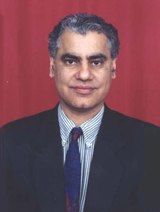
Anand Grover (unaids.org)
"The criminalization of these practices actually hinders the right to health of all persons," Grover said.
Grover denounced the practice of many Asian nations, including China, India, Malaysia, and Vietnam, of forcing drug users to detoxify in massive drug treatment camps. The Open Society Institute reports that more than 50,000 people are being held in such camps in Vietnam and as many as 350,000 in China.
Grover elaborated on his decriminalization remarks in a Tuesday interview with Radio Australia. Remarking on the battle to prevent the spread of HIV/AIDS, Grover said: "Well, you know the success in Asia has been by being able to protect and empower the communities of sex workers, drug users and men having sex with men. But ultimately their rights are not being protected because their right to health is being compromised by, for example, large numbers of drug users who because possession and consumption is illegal in most countries find themselves in either compulsory treatment centers or voluntary treatment centers where it's not the evidence-based treatment which is actually resorted to, but old detoxification, which has a huge relapse rate, and they're subjected to a large number of abuses throughout the region, including in India for instance where NGOs run the centers and they're totally unregulated. And people will end up dying later on."
Grover clarified that he was not talking about legalizing the drug trade. "It's not the drug trade that we want to decriminalize," he said. "I think that large numbers of people who are just simple drug users they find themselves being treated as criminals and their rights abused."
back to top
Only 14.6% of Chileans support marijuana legalization, down from 19% five months ago, according to a newly released Ipsos poll. Some 56% of Chileans reject legalizing marijuana for any reason, the poll found.
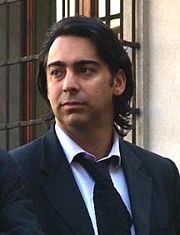
Marco EnrÃquez-Ominami
The news is slightly better on the medical marijuana front. There, support has risen to 28.5%, up from 21.7% in June.
Chile is one of the most socially conservative countries in Latin America. Abortion is illegal there, and divorce became legal only five years ago. Homosexuality became legal a decade ago, but the country does not have an anti-discrimination law that includes sexual orientation.
Marijuana has become something of an issue in the country's presidential elections. Former Socialist Party leader Marco Enriquez-Ominami, who is running as an independent has said that he "is a supporter of looking into the matter of legalizing marijuana."
But Eduardo Frei, candidate of the ruling left-leaning Concordance of Parties for Democracy (CPD) responded in a recent debate that he opposes pot legalization. "All drugs are addictive and they lead to harder drugs," he said.
The first round of the Chilean presidential election is set for December 11.
back to top
November 2, 1951: The Boggs Act nearly quadruples penalties for all narcotics offenses and unscientifically lumps marijuana in with narcotic drugs. (Narcotics are by definition a class of drugs derived from the opium poppy plant, containing opium, or produced synthetically and to have opium-like effects. Opioid drugs relieve pain, dull the senses and induce sleep.)
November 1, 1968: The UK's Advisory Committee on Drug Dependence releases the Wootton Report, recommending that marijuana possession not be a criminal offense.
November 5, 1987: Nina Totenberg of National Public Radio breaks the story that Reagan Supreme Court nominee Douglas Ginsburg admitted to having smoked marijuana with his students "on a few occasions in the '70s" while he was a professor at Harvard. Two days later, President Reagan asks Ginsburg to withdraw his nomination.
October 30, 1995: President Bill Clinton signs legislation passed by Congress rejecting a US Sentencing Commission move to reduce penalties for crack cocaine offenses to bring them equal with powder cocaine.
November 5, 1996: California's Proposition 215 (The Compassionate Use Act) passes with 56% of the voting public in favor. Proposition 200 (The Drug Medicalization, Prevention, and Control Act) in Arizona passes with 65% of the vote.
November 4, 1998: Voters in seven states overwhelmingly approve nine medical marijuana and larger drug policy reform initiatives.
November 3, 1999: The Criminal Justice Policy Foundation (CJPF) cosponsors a press conference and releases a letter to Drug Czar Gen. Barry McCaffrey from distinguished American and Latin American leaders who reject the US export of the failed "war on drugs" to Latin America.
November 3, 2001: DEA raids the Los Angeles Cannabis Resource Center, a medical marijuana distribution facility, arresting its president, Scott Imler. City officials condemn the raid at a press conference attended by more than 100 center members.
October 31, 2002: The Washington Post publishes a story about a rare interview with BenjamÃn Arellano Félix, the man accused of running Mexico's most ruthless drug cartel, from the La Palma maximum security federal prison in Almoloya de Juárez, Mexico. Arellano said the United States has already lost its war on drugs and that violent trafficking gangs will thrive as long as Americans keep buying marijuana, cocaine and heroin.
November 1, 2002: Every prosecutor in the United States is sent a letter from the Office of National Drug Control Policy (ONDCP) and the National District Attorneys Association (NDAA), urging them to make prosecution of cannabis crimes a high priority and to fight efforts to ease drug laws.
November 5, 2002: Reuters reports that researchers say alcohol and violence pose more of an immediate health hazard than drugs for young adults who enjoy clubbing. Researchers say that drugs such as ecstasy, speed, cocaine and heroin are a serious problem in clubs, but assaults fueled by alcohol are the main reason clubbers seek hospital treatment.
back to top
StoptheDrugWar.org (DRCNet) is pleased to be a partner in the upcoming 2009 International Drug Policy Reform Conference, this November 12-14 at the Hyatt Regency in Albuquerque, New Mexico.
The Reform Conference, sponsored by our friends at the Drug Policy Alliance, is the major biennial gathering of drug policy reformers of all kinds. The last one, held in New Orleans in 2007, brought together over 1,000 attendees representing 25 different countries. This year attendees will have the opportunity to spend three days interacting with people committed to finding alternatives to the war on drugs while participating in sessions given by leading experts from around the world. Click here to register -- early bird rates are available through October 9, and discounts are available for students and New Mexico residents.
Some testimonials from the 2007 conference:
"The conference was a tremendous educational experience. I established tons of contacts and look forward to a future dedicated to fighting the drug war."
"Lots of great energy! This was my very first conference and I would most definitely recommend it to any health care professional desiring information on this subject. The speakers were very educated on their subjects and readily available to answer questions."
"This conference has been an incredible experience. The level of knowledge and experience from the presenters has been fantastic."
"I thought the conference was a wonderful collaboration of minds and knowledge on the multiple aspects of drug policy. I enjoyed having applicable speakers on both sides of the debate of policy and drug reform."
"This conference exceeded my expectations in every way possible. As a first year attendee I had no idea what I would learn."
"Once again, thank you for the most exciting and informative conference in the world."
Hope to see you there.
back to top
Do you read Drug War Chronicle? If so, we'd like to hear from you. DRCNet needs two things:
- We are in between newsletter grants, and that makes our need for donations more pressing. Drug War Chronicle is free to read but not to produce! Click here to make a donation by credit card or PayPal, or to print out a form to send in by mail.
- Please send quotes and reports on how you put our flow of information to work, for use in upcoming grant proposals and letters to funders or potential funders. Do you use DRCNet as a source for public speaking? For letters to the editor? Helping you talk to friends or associates about the issue? Research? For your own edification? Have you changed your mind about any aspects of drug policy since subscribing, or inspired you to get involved in the cause? Do you reprint or repost portions of our bulletins on other lists or in other newsletters? Do you have any criticisms or complaints, or suggestions? We want to hear those too. Please send your response -- one or two sentences would be fine; more is great, too -- email [email protected] or reply to a Chronicle email or use our online comment form. Please let us know if we may reprint your comments, and if so, if we may include your name or if you wish to remain anonymous. IMPORTANT: Even if you have given us this kind of feedback before, we could use your updated feedback now too -- we need to hear from you!
Again, please help us keep Drug War Chronicle alive at this important time! Click here to make a donation online, or send your check or money order to: DRCNet, P.O. Box 18402, Washington, DC 20036. Make your check payable to DRCNet Foundation to make a tax-deductible donation for Drug War Chronicle -- remember if you select one of our member premium gifts that will reduce the portion of your donation that is tax-deductible -- or make a non-deductible donation for our lobbying work -- online or check payable to Drug Reform Coordination Network, same address. We can also accept contributions of stock -- email [email protected] for the necessary info.
back to top
Want to help end the "war on drugs," while earning college credit too? Apply for a StoptheDrugWar.org (DRCNet) internship for this summer or fall semester and you could come join the team and help us fight the fight!
StoptheDrugWar has a strong record of providing substantive work experience to our interns -- you won't spend the summer doing filing or running errands, you will play an integral role in one or more of our exciting programs. Options for work you can do with us include coalition outreach as part of the campaign to rein in the use of SWAT teams, to expand our work to repeal the drug provision of the Higher Education Act to encompass other bad drug laws like the similar provisions in welfare and public housing law; blogosphere/web outreach; media research and outreach; web site work (research, writing, technical); possibly other areas. If you are chosen for an internship, we will strive to match your interests and abilities to whichever area is the best fit for you.
While our internships are unpaid, we will reimburse you for metro fare, and DRCNet is a fun and rewarding place to work. To apply, please send your resume to David Guard at [email protected], and feel free to contact us at (202) 293-8340. We hope to hear from you! Check out our web site at http://stopthedrugwar.org to learn more about our organization.
back to top
Along with our weekly in-depth Chronicle reporting, DRCNet also provides daily content in the way of blogging in the Stop the Drug War Speakeasy -- huge numbers of people have been reading it recently -- as well as Latest News links (upper right-hand corner of most web pages), event listings (lower right-hand corner) and other info. Check out DRCNet every day to stay on top of the drug reform game! Check out the Speakeasy main page at http://stopthedrugwar.org/speakeasy.

prohibition-era beer raid, Washington, DC (Library of Congress)
Since last issue:
Scott Morgan writes: "Marijuana Debate! Former Judge vs. Several Complete Idiots," "Efforts to Stop Drugs at the Border Have Become a Joke," "It's Not Just Marijuana -- DEA is at War With Other Medicines Too," "A Marijuana Blog That's the Opposite of All the Others," "Obama Isn't Plotting to Legalize Marijuana, But Everyone Else Is," "Former Drug Czar Lies About His History of Attacking Medical Marijuana" and "It's Official: The Media is in Love With Marijuana Legalization."
Phil Smith previews: "An Historic Hearing on Marijuana Legalization in Sacramento" -- with pictures!
David Borden highlights: "Our Side: San Diego ASA Protests State Narcs Lobby Awards," "Heroin Maintenance Comes to Denmark" and "Nice Article on Wisconsin's Medical Marijuana Bill and the Movement Supporting It."
David Guard posts numerous press releases, action alerts and other organizational announcements in the In the Trenches blog.
Again, http://stopthedrugwar.org/speakeasy is the online place to stay in the loop for the fight to stop the war on drugs. Thanks for reading, and please join us on the comment boards.
back to top



